名词的复习[下学期]
图片预览
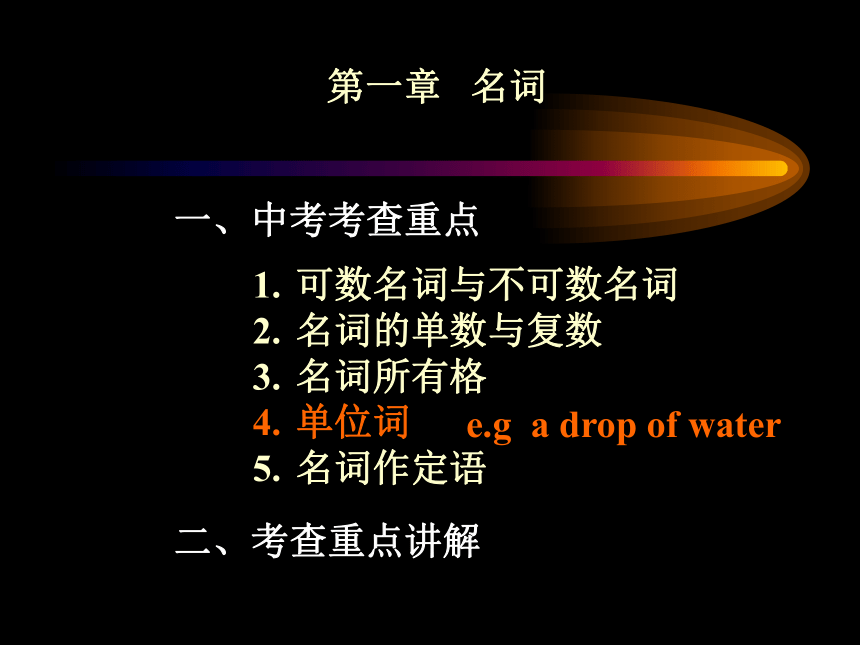
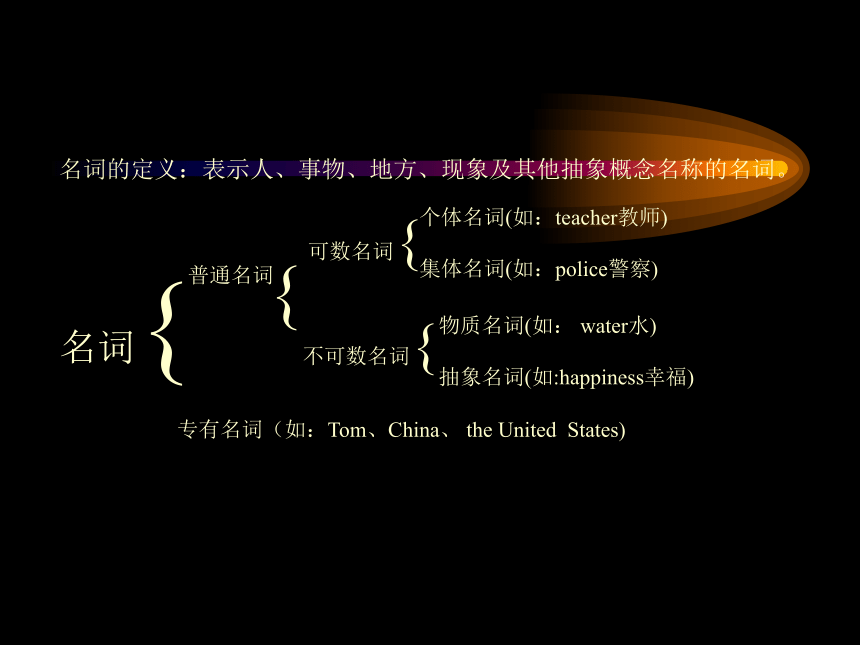
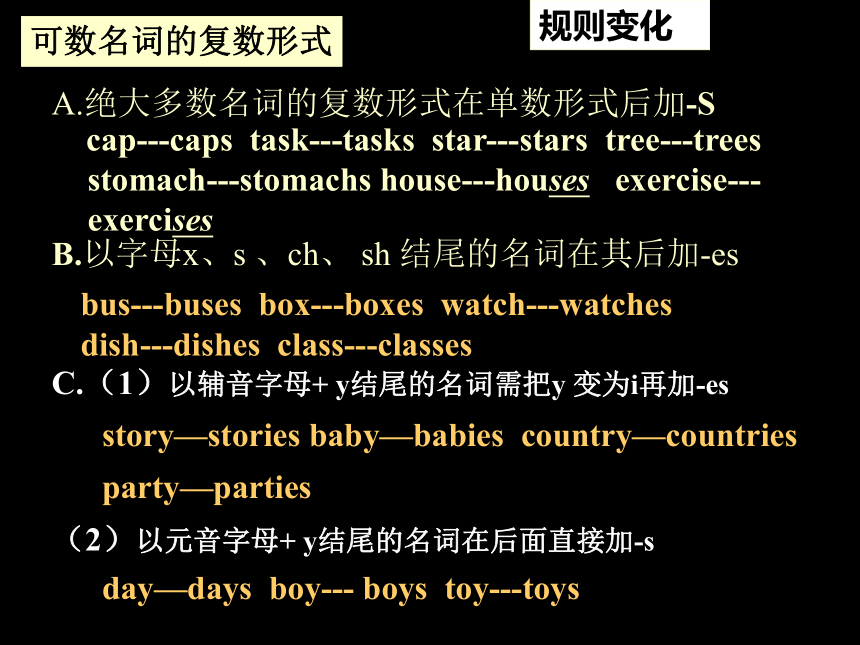
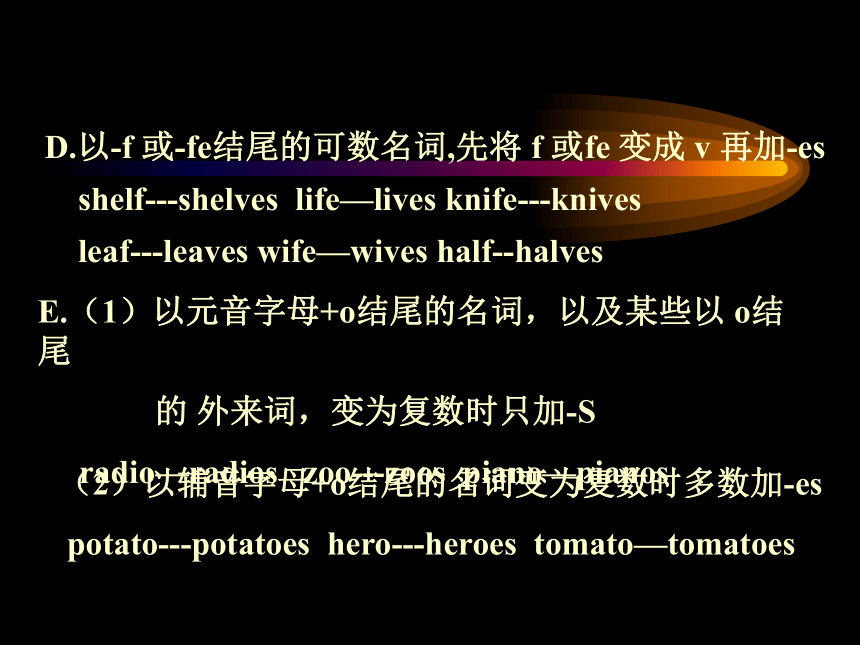
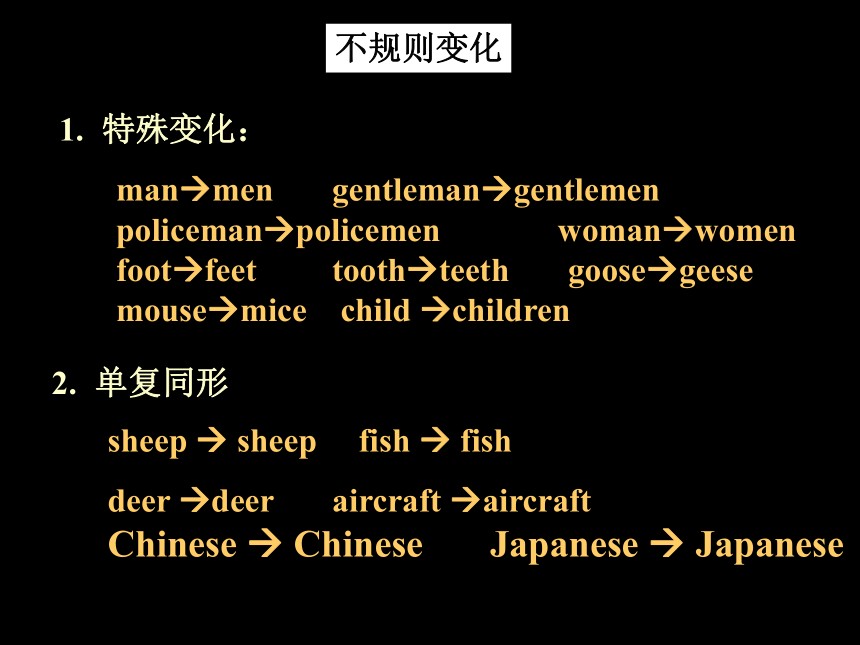
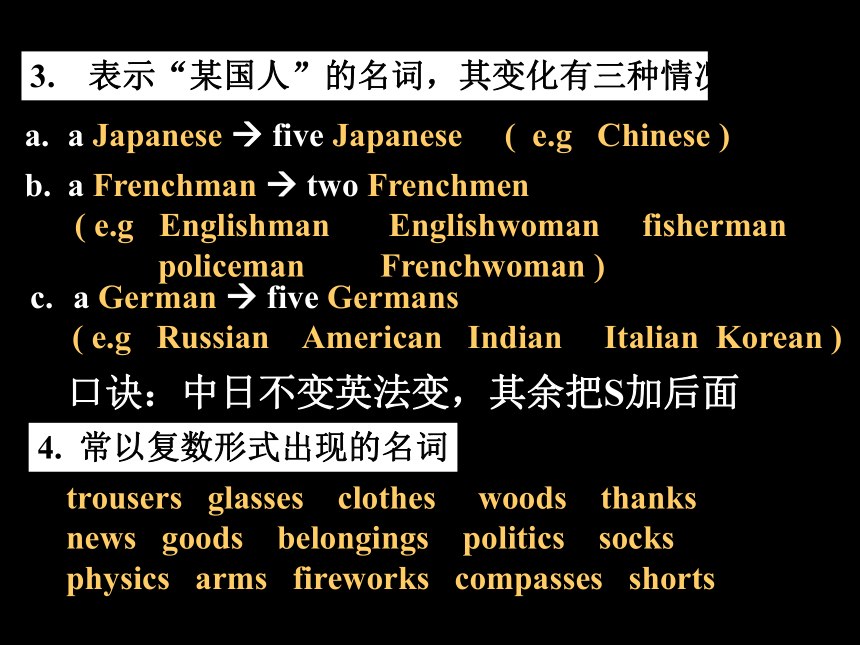
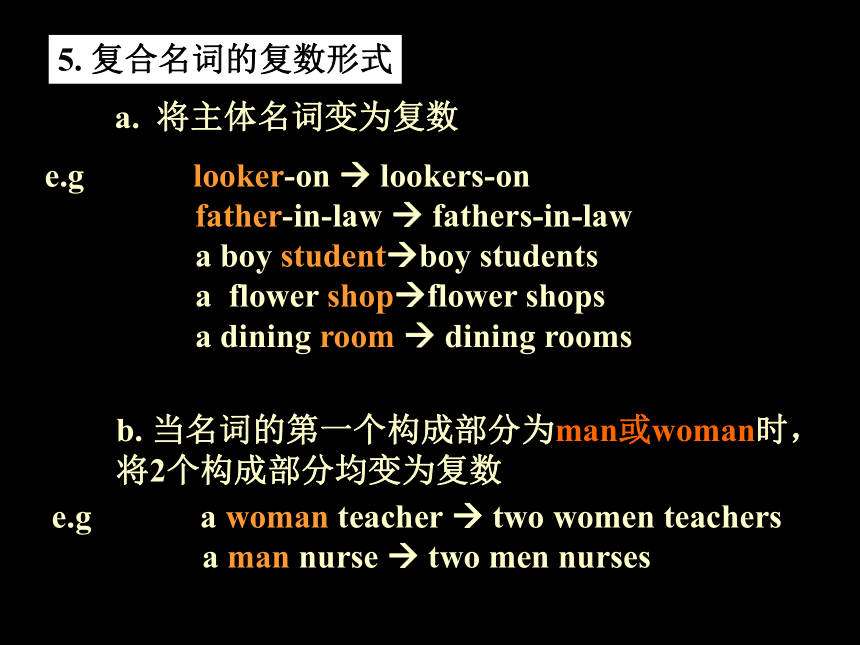
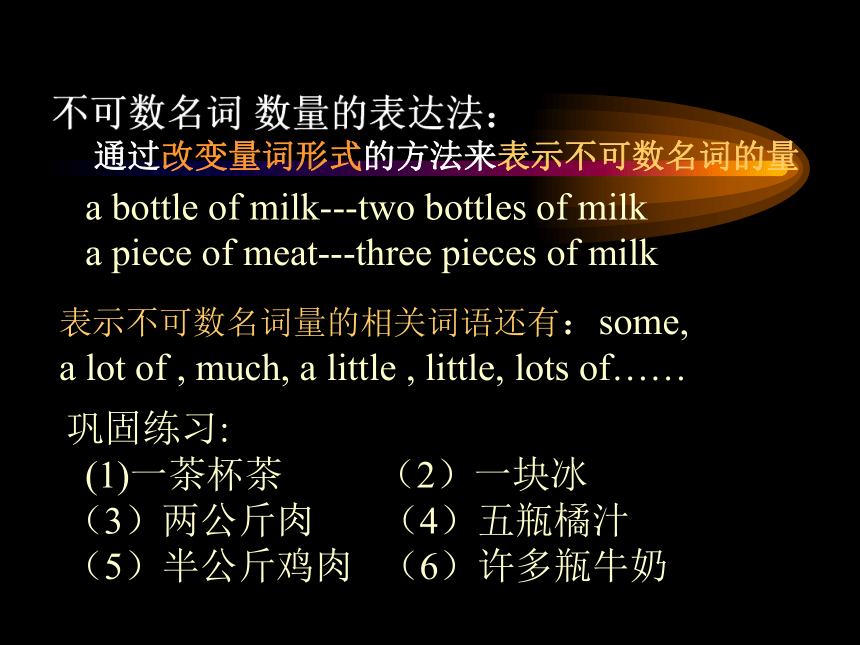
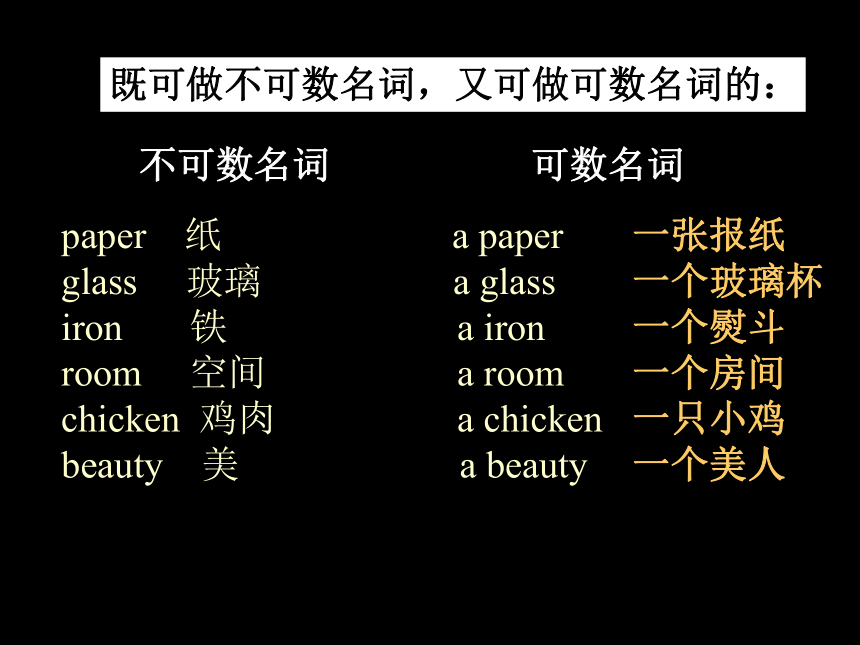
文档简介
课件22张PPT。 第一章 名词一、中考考查重点
二、考查重点讲解可数名词与不可数名词
名词的单数与复数
名词所有格
单位词
名词作定语e.g a drop of water名词{
专有名词(如:Tom、China、 the United States) 可数名词{普通名词{物质名词(如: water水)
抽象名词(如:happiness幸福)个体名词(如:teacher教师)
集体名词(如:police警察)不可数名词{名词的定义:表示人、事物、地方、现象及其他抽象概念名称的名词。 cap---caps task---tasks star---stars tree---trees stomach---stomachs house---houses exercise---exercises
可数名词的复数形式规则变化A.绝大多数名词的复数形式在单数形式后加-S
B.以字母x、s 、ch、 sh 结尾的名词在其后加-es
bus---buses box---boxes watch---watches
dish---dishes class---classesC.(1)以辅音字母+ y结尾的名词需把y 变为i再加-es
story—stories baby—babies country—countries
party—parties
(2)以元音字母+ y结尾的名词在后面直接加-s
day—days boy--- boys toy---toys
E.(1)以元音字母+o结尾的名词,以及某些以 o结尾
的 外来词,变为复数时只加-S
radio—radios zoo---zoos piano—pianos
D.以-f 或-fe结尾的可数名词,先将 f 或fe 变成 v 再加-es
shelf---shelves life—lives knife---knives
leaf---leaves wife—wives half--halves(2)以辅音字母+o结尾的名词变为复数时多数加-es
potato---potatoes hero---heroes tomato—tomatoes
不规则变化特殊变化:单复同形 man?men gentleman?gentlemen policeman?policemen woman?women foot?feet tooth?teeth goose?geese mouse?mice child ?children
sheep ? sheep fish ? fish
deer ?deer aircraft ?aircraft
Chinese ? Chinese Japanese ? Japanese3. 表示“某国人”的名词,其变化有三种情况 a Japanese ? five Japanese ( e.g Chinese )a Frenchman ? two Frenchmen
( e.g Englishman Englishwoman fisherman
policeman Frenchwoman )a German ? five Germans
( e.g Russian American Indian Italian Korean )4. 常以复数形式出现的名词trousers glasses clothes woods thanks
news goods belongings politics socks
physics arms fireworks compasses shorts口诀:中日不变英法变,其余把S加后面5. 复合名词的复数形式a. 将主体名词变为复数e.g looker-on ? lookers-on
father-in-law ? fathers-in-law
a boy student?boy students
a flower shop?flower shops
a dining room ? dining roomsb. 当名词的第一个构成部分为man或woman时,
将2个构成部分均变为复数e.g a woman teacher ? two women teachers
a man nurse ? two men nurses不可数名词 数量的表达法:
通过改变量词形式的方法来表示不可数名词的量 a bottle of milk---two bottles of milk
a piece of meat---three pieces of milk表示不可数名词量的相关词语还有:some,
a lot of , much, a little , little, lots of……巩固练习:
(1)一茶杯茶 (2)一块冰
(3)两公斤肉 (4)五瓶橘汁
(5)半公斤鸡肉 (6)许多瓶牛奶既可做不可数名词,又可做可数名词的: 不可数名词 可数名词 paper 纸 a paper
glass 玻璃 a glass
iron 铁 a iron
room 空间 a room
chicken 鸡肉 a chicken
beauty 美 a beauty一张报纸
一个玻璃杯
一个熨斗
一个房间
一只小鸡
一个美人 专有名词:
1.表示人名 如:Jim Kate Li Lei Miss Gao
2.表示地名:如: China USA England Beijing
3.表示星期、月份等时间概念的名称,如:
Sunday Monday Tuesday January February
4.表示中外节日:
国际性节日:New Year May Day Children’s Day
Women’s Day
中国节日: Spring Festival Mid-autumn Day
National Day
西方节日: Christmas Day Easter(复活节)Father’s Day
Mother’s Day Saint Valentine’s Day(情人节)
5. 机构或一些社会团体的名称,它们往往缩写,如:
CCTV UN WTO PLA PRC
,
UN WTO PLA PRC
名词的所有格1. 一般单数的名词所有格(有生命的东西)所有格用’s 的形式: Mike’s bag the boy’s knife
2.在词尾有-S的复数名词所有格,只在词尾加’,读音与名词变复数同
the students’ books the teachers’ office 3.不规则名词复数的所有格,即词尾不是以-s结尾的单词,在词后
加’s , 如: Women’s Day men’s clothes shop
4.如果事物为 2人或2人以上共同所有,在最后一个名词后加-’s; 珍妮和海伦的房间
Jenny and Helen’s roomJenny’s and Helen’s rooms变化形式:5.如果事物不是 2人或2人共同所有,而是分别有的,则在 2个名词
后都加-’s
珍妮的房间和海伦的房间6. 无生命的东西一般用“ of +名词”的形式表示其所有格the door of the room the wall of the park7. 有些表示时间、距离、国家、城市、团体的等无生
命的东西,也可以加 -‘s 构成所有格 2小时路程
北京最好的公园
今日报纸
车站休息室two hours’ walkBeijing’s best parktoday’s newspaper the station’s waiting-room at my uncle’s = at my uncle’s home
at a tailor’s = at a tailor’s shop9. 表示类别的名词作定语,不用所有格
a silk hat cotton cloth
a coffee cup
8. 表示某人的家、店铺、诊所时,常省略所有格
后面的名词
my teacher’s office
students’ exercise books
Children’s Palace
today’s newspaper
15 minutes’ walk = a 15-minute walk
at the butcher’s = at the butcher’s shop
to Tom’s = to Tom’s house 1 我老师的办公室
2 学生们 的练习本
3 少年宫
4 今天的报纸
5 十五分钟的路程
6 在肉店
7 到汤姆家去名词的所有格 Practice 8 广东的省会
9 教室的门
10 我父亲的一个朋友
11 他的两个兄弟
12 爱迪生的一些发明
13 他弟弟的一张照片(照片属于他弟弟)
14 他弟弟的一张照片(照片里的人是他弟弟)the capital of Guangdongthe doors of the classrooma friend of my father (’s)two brothers of hissome inventions of Edison’s a picture of his brothers’ a picture of his brother名词做定语 e.g a coffee cup a woman driver
summer holiday a milk bottle
a tooth brush注意:
两周的假
一个10岁的男孩 a two-week vacation a ten-year-old boy睡2个小时的觉
做半小时车的路 two hours’ sleephalf an hour’s drive主谓一致当class, family, team, group, public 等集体名词做
主语时,如果看成一个整体,动词就用单数;看成一
个个具体成员时,就用复数。e.g The class are waiting for her.
Tom’s family _____ rather big.
Tom’s family _________ are film fans. is are2. news, maths, politics 表示单数意义,动词用单数。e.g The news makes her very happy.
Maths ___ not easy for him. is3. 像goods, compasses, chopsticks, shoes, glasses, savings,
trousers, belongs 等表示复数含义的词,动词用复数。e.g The shoes are hers.
The savings ______ for your future use. are但是: A pair of glasses _____ on the table.
Two pairs of glasses ______ on the table. is are4. police, people(人们), youth(青年们) 只有单数形式,
但表示复数意义,动词用复数。e.g The police are gathering in the street.
The Chinese people _____ peace. love但是: people当“民族”,youth当“男青年”讲时,
有单复数之分 e.g He is a youth of 20.
Many English-speaking peoples _____ this book.
like5. 像deer、sheep等单复同形的词,动词单复根据
具体情况定e.g A deer is over there in the field.
A group of deer ______ over there in the field. are6. The poet and musician ______ present at the party.
The singer and dancer _____ just arrived.
The bread and the butter _______ ready.
Bread and butter ____ her usual breakfast. 涂了黄油的面包 was has are is8. Both … and …的谓语动词用复数形式。e.g. Both he and his father ________ there. were7. 采取就近一致原则的句型结构: There be … e.g. There ___ a book and two apples on the desk.
not only…but also… e.g Not only you but also he ___ right.
either…or e.g Either he or I ____ wrong.
neither…nor e.g Neither she nor I _____ right. is is am am表示时间、距离 、金额、度量、书名、国名等的
复数名词,看作整体,动词用单数。
e.g Eight hours of sleep_____ enough for you .
Ten dollars _____ too much to pay. is is 10. each + 单数名词 + and + each + 单数名词
every +单数名词 + and +every + 单数名词
no +单数名词 + and + no + 单数名词 each of + 复数名词
one of + 复数名词many a + 单数名词every / each +单数名词+ and + 单数名词 等结构做主语时,动词用单数。 e.g. Each boy and each girl ______ seen the film.
No teacher and no student _____ come yet.
Every knife, fork , and spoon ____ to be bought.
Each of the students ______ a dictionary. has has has has e.g The old man with his two sons ______ left for America .
Miss Wang as well as his friends _____ waiting there . has is11.
注: 由 as well as, together with, with, besides,
but, except 等词连接两个名词做主语时,动词的
单复数根据as well as 等词前面的名词来定。 12. part of / most of / some of / half of / all of /
the rest of / lots of / a lot of / plenty of 等加名
词做主语时,动词的单复数根据该名词的单复
数决定。 e.g Half of his money _______ gone .
Half of his books ________ new.
All of the food ______ missing.
All of her friends ______ very honest. is are is are Thank you for enjoying my class!Goodbye
二、考查重点讲解可数名词与不可数名词
名词的单数与复数
名词所有格
单位词
名词作定语e.g a drop of water名词{
专有名词(如:Tom、China、 the United States) 可数名词{普通名词{物质名词(如: water水)
抽象名词(如:happiness幸福)个体名词(如:teacher教师)
集体名词(如:police警察)不可数名词{名词的定义:表示人、事物、地方、现象及其他抽象概念名称的名词。 cap---caps task---tasks star---stars tree---trees stomach---stomachs house---houses exercise---exercises
可数名词的复数形式规则变化A.绝大多数名词的复数形式在单数形式后加-S
B.以字母x、s 、ch、 sh 结尾的名词在其后加-es
bus---buses box---boxes watch---watches
dish---dishes class---classesC.(1)以辅音字母+ y结尾的名词需把y 变为i再加-es
story—stories baby—babies country—countries
party—parties
(2)以元音字母+ y结尾的名词在后面直接加-s
day—days boy--- boys toy---toys
E.(1)以元音字母+o结尾的名词,以及某些以 o结尾
的 外来词,变为复数时只加-S
radio—radios zoo---zoos piano—pianos
D.以-f 或-fe结尾的可数名词,先将 f 或fe 变成 v 再加-es
shelf---shelves life—lives knife---knives
leaf---leaves wife—wives half--halves(2)以辅音字母+o结尾的名词变为复数时多数加-es
potato---potatoes hero---heroes tomato—tomatoes
不规则变化特殊变化:单复同形 man?men gentleman?gentlemen policeman?policemen woman?women foot?feet tooth?teeth goose?geese mouse?mice child ?children
sheep ? sheep fish ? fish
deer ?deer aircraft ?aircraft
Chinese ? Chinese Japanese ? Japanese3. 表示“某国人”的名词,其变化有三种情况 a Japanese ? five Japanese ( e.g Chinese )a Frenchman ? two Frenchmen
( e.g Englishman Englishwoman fisherman
policeman Frenchwoman )a German ? five Germans
( e.g Russian American Indian Italian Korean )4. 常以复数形式出现的名词trousers glasses clothes woods thanks
news goods belongings politics socks
physics arms fireworks compasses shorts口诀:中日不变英法变,其余把S加后面5. 复合名词的复数形式a. 将主体名词变为复数e.g looker-on ? lookers-on
father-in-law ? fathers-in-law
a boy student?boy students
a flower shop?flower shops
a dining room ? dining roomsb. 当名词的第一个构成部分为man或woman时,
将2个构成部分均变为复数e.g a woman teacher ? two women teachers
a man nurse ? two men nurses不可数名词 数量的表达法:
通过改变量词形式的方法来表示不可数名词的量 a bottle of milk---two bottles of milk
a piece of meat---three pieces of milk表示不可数名词量的相关词语还有:some,
a lot of , much, a little , little, lots of……巩固练习:
(1)一茶杯茶 (2)一块冰
(3)两公斤肉 (4)五瓶橘汁
(5)半公斤鸡肉 (6)许多瓶牛奶既可做不可数名词,又可做可数名词的: 不可数名词 可数名词 paper 纸 a paper
glass 玻璃 a glass
iron 铁 a iron
room 空间 a room
chicken 鸡肉 a chicken
beauty 美 a beauty一张报纸
一个玻璃杯
一个熨斗
一个房间
一只小鸡
一个美人 专有名词:
1.表示人名 如:Jim Kate Li Lei Miss Gao
2.表示地名:如: China USA England Beijing
3.表示星期、月份等时间概念的名称,如:
Sunday Monday Tuesday January February
4.表示中外节日:
国际性节日:New Year May Day Children’s Day
Women’s Day
中国节日: Spring Festival Mid-autumn Day
National Day
西方节日: Christmas Day Easter(复活节)Father’s Day
Mother’s Day Saint Valentine’s Day(情人节)
5. 机构或一些社会团体的名称,它们往往缩写,如:
CCTV UN WTO PLA PRC
,
UN WTO PLA PRC
名词的所有格1. 一般单数的名词所有格(有生命的东西)所有格用’s 的形式: Mike’s bag the boy’s knife
2.在词尾有-S的复数名词所有格,只在词尾加’,读音与名词变复数同
the students’ books the teachers’ office 3.不规则名词复数的所有格,即词尾不是以-s结尾的单词,在词后
加’s , 如: Women’s Day men’s clothes shop
4.如果事物为 2人或2人以上共同所有,在最后一个名词后加-’s; 珍妮和海伦的房间
Jenny and Helen’s roomJenny’s and Helen’s rooms变化形式:5.如果事物不是 2人或2人共同所有,而是分别有的,则在 2个名词
后都加-’s
珍妮的房间和海伦的房间6. 无生命的东西一般用“ of +名词”的形式表示其所有格the door of the room the wall of the park7. 有些表示时间、距离、国家、城市、团体的等无生
命的东西,也可以加 -‘s 构成所有格 2小时路程
北京最好的公园
今日报纸
车站休息室two hours’ walkBeijing’s best parktoday’s newspaper the station’s waiting-room at my uncle’s = at my uncle’s home
at a tailor’s = at a tailor’s shop9. 表示类别的名词作定语,不用所有格
a silk hat cotton cloth
a coffee cup
8. 表示某人的家、店铺、诊所时,常省略所有格
后面的名词
my teacher’s office
students’ exercise books
Children’s Palace
today’s newspaper
15 minutes’ walk = a 15-minute walk
at the butcher’s = at the butcher’s shop
to Tom’s = to Tom’s house 1 我老师的办公室
2 学生们 的练习本
3 少年宫
4 今天的报纸
5 十五分钟的路程
6 在肉店
7 到汤姆家去名词的所有格 Practice 8 广东的省会
9 教室的门
10 我父亲的一个朋友
11 他的两个兄弟
12 爱迪生的一些发明
13 他弟弟的一张照片(照片属于他弟弟)
14 他弟弟的一张照片(照片里的人是他弟弟)the capital of Guangdongthe doors of the classrooma friend of my father (’s)two brothers of hissome inventions of Edison’s a picture of his brothers’ a picture of his brother名词做定语 e.g a coffee cup a woman driver
summer holiday a milk bottle
a tooth brush注意:
两周的假
一个10岁的男孩 a two-week vacation a ten-year-old boy睡2个小时的觉
做半小时车的路 two hours’ sleephalf an hour’s drive主谓一致当class, family, team, group, public 等集体名词做
主语时,如果看成一个整体,动词就用单数;看成一
个个具体成员时,就用复数。e.g The class are waiting for her.
Tom’s family _____ rather big.
Tom’s family _________ are film fans. is are2. news, maths, politics 表示单数意义,动词用单数。e.g The news makes her very happy.
Maths ___ not easy for him. is3. 像goods, compasses, chopsticks, shoes, glasses, savings,
trousers, belongs 等表示复数含义的词,动词用复数。e.g The shoes are hers.
The savings ______ for your future use. are但是: A pair of glasses _____ on the table.
Two pairs of glasses ______ on the table. is are4. police, people(人们), youth(青年们) 只有单数形式,
但表示复数意义,动词用复数。e.g The police are gathering in the street.
The Chinese people _____ peace. love但是: people当“民族”,youth当“男青年”讲时,
有单复数之分 e.g He is a youth of 20.
Many English-speaking peoples _____ this book.
like5. 像deer、sheep等单复同形的词,动词单复根据
具体情况定e.g A deer is over there in the field.
A group of deer ______ over there in the field. are6. The poet and musician ______ present at the party.
The singer and dancer _____ just arrived.
The bread and the butter _______ ready.
Bread and butter ____ her usual breakfast. 涂了黄油的面包 was has are is8. Both … and …的谓语动词用复数形式。e.g. Both he and his father ________ there. were7. 采取就近一致原则的句型结构: There be … e.g. There ___ a book and two apples on the desk.
not only…but also… e.g Not only you but also he ___ right.
either…or e.g Either he or I ____ wrong.
neither…nor e.g Neither she nor I _____ right. is is am am表示时间、距离 、金额、度量、书名、国名等的
复数名词,看作整体,动词用单数。
e.g Eight hours of sleep_____ enough for you .
Ten dollars _____ too much to pay. is is 10. each + 单数名词 + and + each + 单数名词
every +单数名词 + and +every + 单数名词
no +单数名词 + and + no + 单数名词 each of + 复数名词
one of + 复数名词many a + 单数名词every / each +单数名词+ and + 单数名词 等结构做主语时,动词用单数。 e.g. Each boy and each girl ______ seen the film.
No teacher and no student _____ come yet.
Every knife, fork , and spoon ____ to be bought.
Each of the students ______ a dictionary. has has has has e.g The old man with his two sons ______ left for America .
Miss Wang as well as his friends _____ waiting there . has is11.
注: 由 as well as, together with, with, besides,
but, except 等词连接两个名词做主语时,动词的
单复数根据as well as 等词前面的名词来定。 12. part of / most of / some of / half of / all of /
the rest of / lots of / a lot of / plenty of 等加名
词做主语时,动词的单复数根据该名词的单复
数决定。 e.g Half of his money _______ gone .
Half of his books ________ new.
All of the food ______ missing.
All of her friends ______ very honest. is are is are Thank you for enjoying my class!Goodbye
同课章节目录
- 词法
- 名词
- 动词和动词短语
- 动词语态
- 动词时态
- 助动词和情态动词
- 非谓语动词
- 冠词
- 代词
- 数词和量词
- 形容词副词及其比较等级
- 介词和介词短语
- 连词和感叹词
- 构词法
- 相似、相近词比较
- 句法
- 陈述句
- 一般疑问句和否定疑问句
- 特殊疑问句及选择疑问句
- 反意疑问句
- 存在句(There be句型)
- 宾语从句
- 定语从句
- 状语从句
- 主谓一致问题
- 简单句
- 并列句
- 复合句
- 主谓一致
- 主、表语从句
- 名词性从句
- 直接引语和间接引语
- 虚拟语气
- 感叹句
- 强调句
- 倒装句
- 祈使句
- 句子的成分
- 句子的分类
- 题型专区
- 单项选择部分
- 易错题
- 完形填空
- 阅读理解
- 词汇练习
- 听说训练
- 句型转换
- 补全对话
- 短文改错
- 翻译
- 书面表达
- 任务型阅读
- 语法填空
- 其他资料
